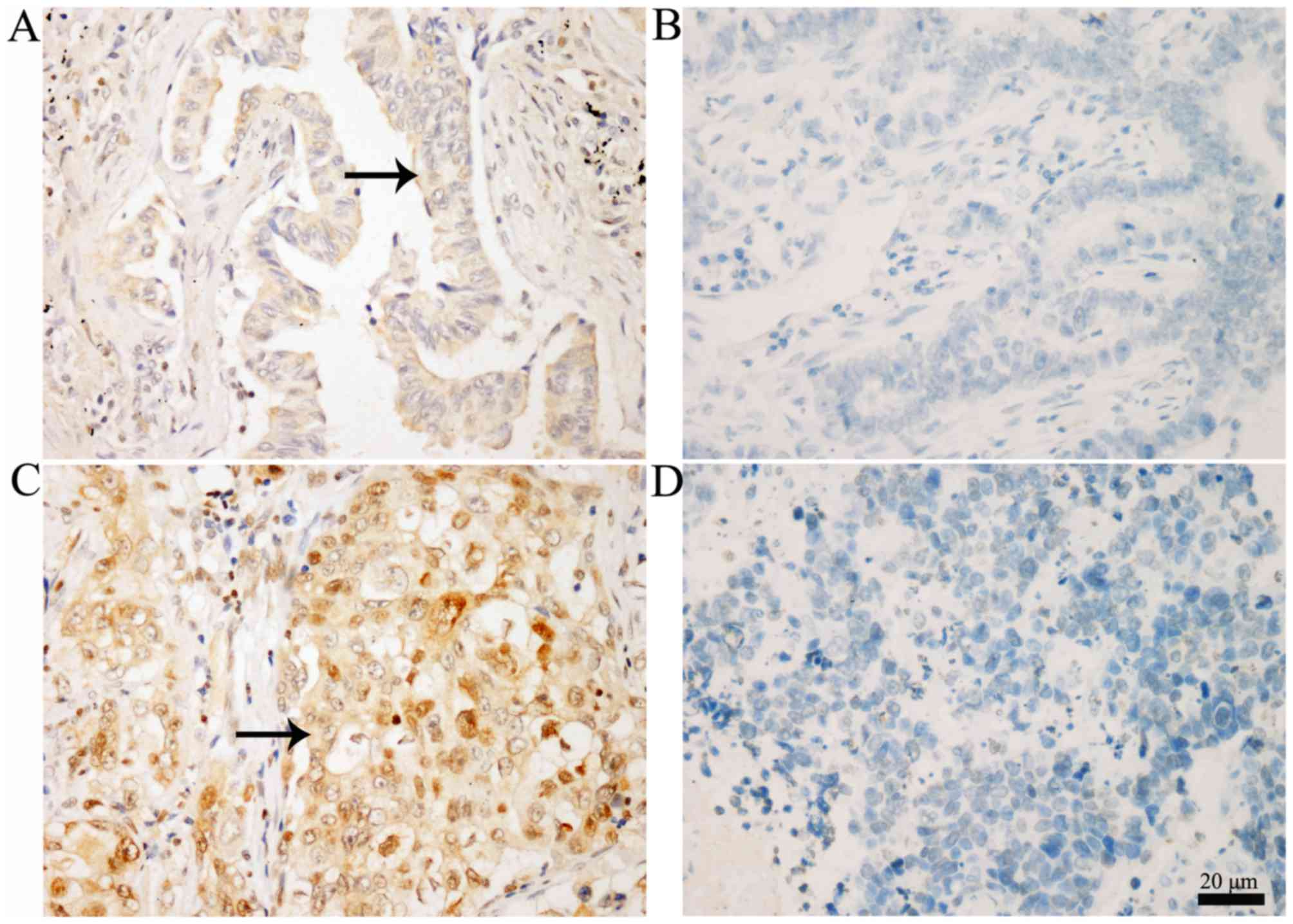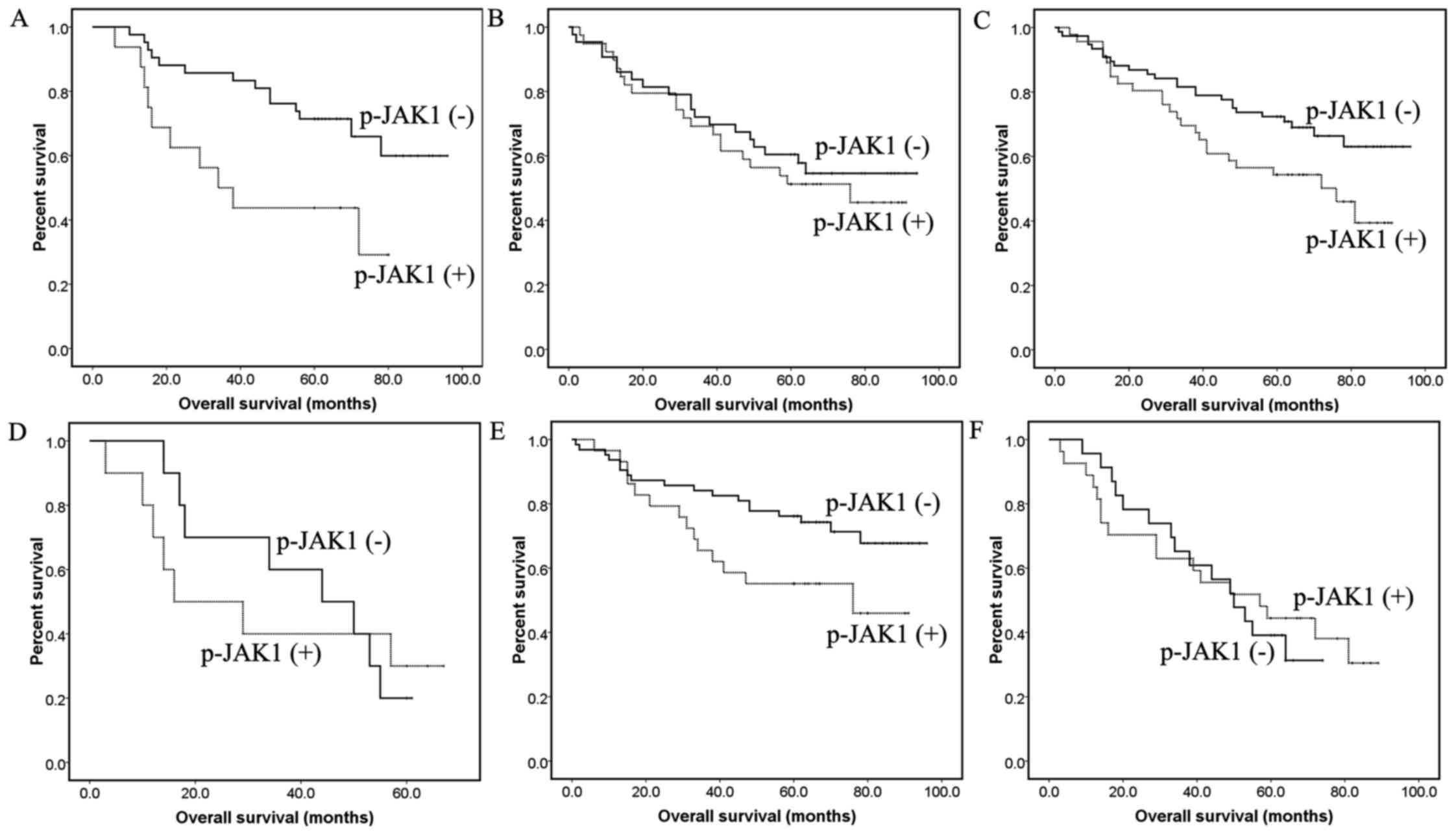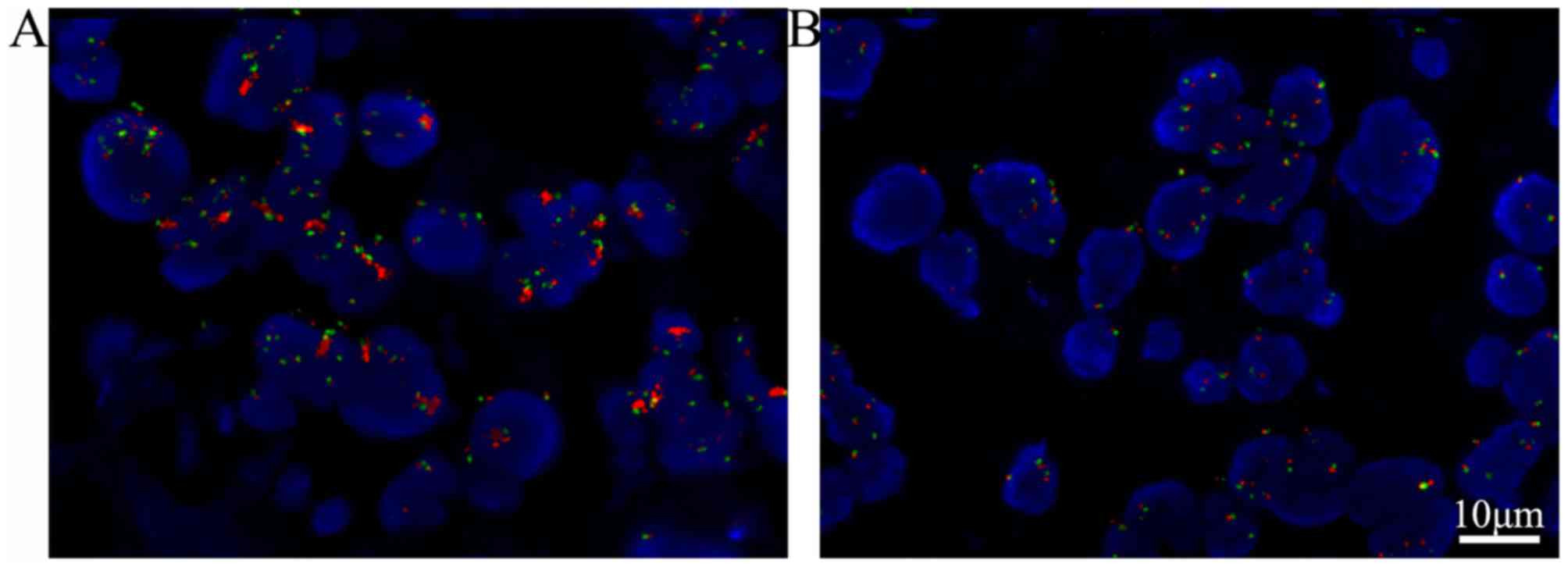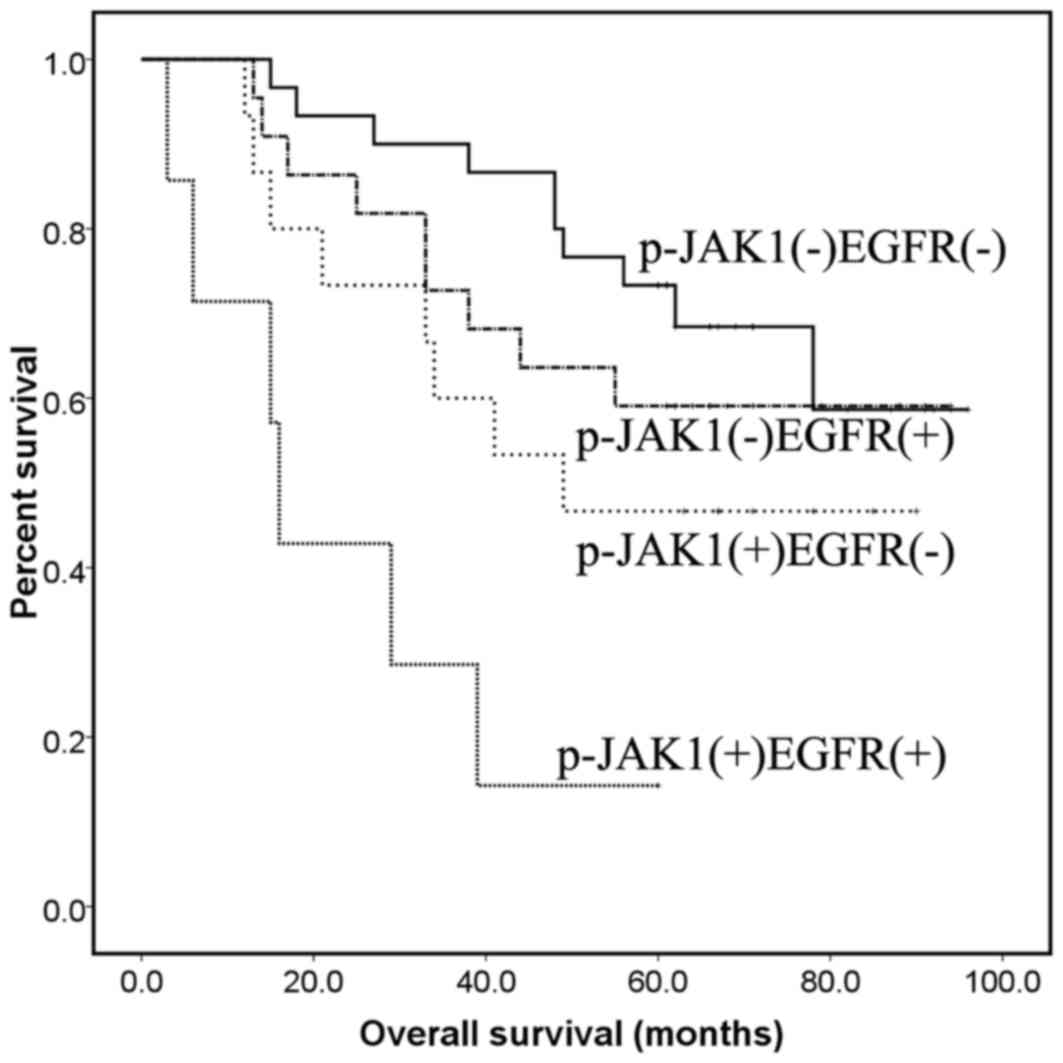|
1
|
Peters S, Adjei AA, Gridelli C, Reck M,
Kerr K and Felip E: ESMO Guidelines Working Group: Metastatic
non-small-cell lung cancer (NSCLC): ESMO clinical practice
guidelines for diagnosis, treatment and follow-up. Ann Oncol.
23:(Suppl 7). vii56–vii64. 2012. View Article : Google Scholar : PubMed/NCBI
|
|
2
|
Siegel RL, Miller KD and Jemal A: Cancer
statistics, 2015. CA Cancer J Clin. 65:5–29. 2015. View Article : Google Scholar : PubMed/NCBI
|
|
3
|
Liu D, Huang Y, Chen B, Zeng J, Guo N,
Zhang S, Liu L, Xu H, Mo X and Li W: Activation of mammalian target
of rapamycin pathway confers adverse outcome in nonsmall cell lung
carcinoma. Cancer. 117:3763–3773. 2011. View Article : Google Scholar : PubMed/NCBI
|
|
4
|
Rawlings JS, Rosler KM and Harrison DA:
The JAK/STAT signaling pathway. J Cell Sci. 117:1281–1283. 2004.
View Article : Google Scholar : PubMed/NCBI
|
|
5
|
Constantinescu SN, Leroy E, Gryshkova V,
Pecquet C and Dusa A: Activating Janus kinase pseudokinase domain
mutations in myeloproliferative and other blood cancers. Biochem
Soc Trans. 41:1048–1054. 2013. View Article : Google Scholar : PubMed/NCBI
|
|
6
|
Bergmann AK, Schneppenheim S, Seifert M,
Betts MJ, Haake A, Lopez C, Maria Murga, Penas E, Vater I, Jayne S,
Dyer MJ, et al: Recurrent mutation of JAK3 in T-cell prolymphocytic
leukemia. Genes Chromosomes Cancer. 53:309–316. 2014. View Article : Google Scholar : PubMed/NCBI
|
|
7
|
Wang SW and Sun YM: The IL-6/JAK/STAT3
pathway: Potential therapeutic strategies in treating colorectal
cancer (Review). Int J Oncol. 44:1032–1040. 2014. View Article : Google Scholar : PubMed/NCBI
|
|
8
|
Gurbuz V, Konac E, Varol N, Yilmaz A,
Gurocak S, Menevse S and Sozen S: Effects of AG490 and S3I-201 on
regulation of the JAK/STAT3 signaling pathway in relation to
angiogenesis in TRAIL-resistant prostate cancer cells. Oncol Lett.
7:755–763. 2014.PubMed/NCBI
|
|
9
|
Schindler C, Levy DE and Decker T:
JAK-STAT signaling: From interferons to cytokines. J Biol Chem.
282:20059–20063. 2007. View Article : Google Scholar : PubMed/NCBI
|
|
10
|
Xie H, Bae H, Noh J, Eun JW, Kim JK, Jung
KH, Ryu JC, Ahn YM, Kim SY, Lee SH, et al: Mutational analysis of
JAK1 gene in human hepatocellular carcinoma. Neoplasma. 56:136–140.
2009. View Article : Google Scholar : PubMed/NCBI
|
|
11
|
Jeong EG, Kim MS, Nam HK, Min CK, Lee S,
Chung YJ, Yoo NJ and Lee SH: Somatic mutations of JAK1 and JAK3 in
acute leukemias and solid cancers. Clin Cancer Res. 14:3716–3721.
2008. View Article : Google Scholar : PubMed/NCBI
|
|
12
|
You Z, Xu D, Ji J, Guo W, Zhu W and He J:
JAK/STAT signal pathway activation promotes progression and
survival of human oesophageal squamous cell carcinoma. Clin Transl
Oncol. 14:143–149. 2012. View Article : Google Scholar : PubMed/NCBI
|
|
13
|
Liu D, Huang Y, Zeng J, Chen B, Huang N,
Guo N, Liu L, Xu H, Mo X and Li W: Down-regulation of JAK1 by RNA
interference inhibits growth of the lung cancer cell line A549 and
interferes with the PI3K/mTOR pathway. J Cancer Res Clin Oncol.
137:1629–1640. 2011. View Article : Google Scholar : PubMed/NCBI
|
|
14
|
Hirsch FR, Varella-Garcia M, McCoy J, West
H, Xavier AC, Gumerlock P, Bunn PA Jr, Franklin WA, Crowley J and
Gandara DR: Southwest Oncology Group: Increased epidermal growth
factor receptor gene copy number detected by fluorescence in situ
hybridization associates with increased sensitivity to gefitinib in
patients with bronchioloalveolar carcinoma subtypes: A southwest
oncology group study. J Clin Oncol. 23:6838–6845. 2005. View Article : Google Scholar : PubMed/NCBI
|
|
15
|
Lee Y, Shim HS, Park MS, Kim JH, Ha SJ,
Kim SH and Cho BC: High EGFR gene copy number and skin rash as
predictive markers for EGFR tyrosine kinase inhibitors in patients
with advanced squamous cell lung carcinoma. Clin Cancer Res.
18:1760–1768. 2012. View Article : Google Scholar : PubMed/NCBI
|
|
16
|
Shan L, Wang Z, Guo L, Sun H, Qiu T, Ling
Y, Li W, Li L, Liu X, Zheng B, et al: Concurrence of EGFR
amplification and sensitizing mutations indicate a better survival
benefit from EGFR-TKI therapy in lung adenocarcinoma patients. Lung
Cancer. 89:337–342. 2015. View Article : Google Scholar : PubMed/NCBI
|
|
17
|
Koh Y, Jang B, Jeon YK, Kim TM, Lee SH,
Kim DW, Chung DH, Kim YT, Kim YW and Heo DS: EGFR gene copy number
gain is related to high tumor SUV and frequent relapse after
adjuvant chemotherapy in resected lung adenocarcinoma. Jpn J Clin
Oncol. 41:548–554. 2011. View Article : Google Scholar : PubMed/NCBI
|
|
18
|
UICC and IUAC: TNM classification of
malignant tumours. Wiley; New York, NY: 2002
|
|
19
|
Travis W, Brambilla E, Muller-Hermlink H
and Harris C: World Health Organization classification of
tumoursPathology and genetics of tumours of the lung, pleura,
thymus and heart. IARC Press; Lyon: 2004
|
|
20
|
NCCN: NCCN Clinical practice guideline in
oncology-non-small cell lung cancer guideline 2004. http://www.nccn.org2004.
|
|
21
|
Dacic S, Flanagan M, Cieply K, Ramalingam
S, Luketich J, Belani C and Yousem SA: Significance of EGFR protein
expression and gene amplification in non-small cell lung carcinoma.
Am J Clin Pathol. 125:860–865. 2006. View Article : Google Scholar : PubMed/NCBI
|
|
22
|
Varella-Garcia M: Stratification of
non-small cell lung cancer patients for therapy with epidermal
growth factor receptor inhibitors: The EGFR fluorescence in situ
hybridization assay. Diagn Pathol. 1:192006. View Article : Google Scholar : PubMed/NCBI
|
|
23
|
Murakami T, Takigawa N, Ninomiya T, Ochi
N, Yasugi M, Honda Y, Kubo T, Ichihara E, Hotta K, Tanimoto M and
Kiura K: Effect of AZD1480 in an epidermal growth factor
receptor-driven lung cancer model. Lung Cancer. 83:30–36. 2014.
View Article : Google Scholar : PubMed/NCBI
|
|
24
|
Hedvat M, Huszar D, Herrmann A, Gozgit JM,
Schroeder A, Sheehy A, Buettner R, Proia D, Kowolik CM, Xin H, et
al: The JAK2 inhibitor AZD1480 potently blocks Stat3 signaling and
oncogenesis in solid tumors. Cancer Cell. 16:487–497. 2009.
View Article : Google Scholar : PubMed/NCBI
|
|
25
|
Torres AF, Nogueira C, Magalhaes J, Costa
IS, Aragao A, Gomes Neto A, Martins F and Tavora F: Expression of
EGFR and molecules downstream to PI3K/Akt, Raf-1-MEK-1-MAP
(Erk1/2), and JAK (STAT3) pathways in invasive lung adenocarcinomas
resected at a single institution. Anal Cell Pathol (Amst).
2014:3529252014.PubMed/NCBI
|
|
26
|
Cordero JB, Stefanatos RK, Myant K, Vidal
M and Sansom OJ: Non-autonomous crosstalk between the Jak/Stat and
Egfr pathways mediates Apc1-driven intestinal stem cell hyperplasia
in the Drosophila adult midgut. Development. 139:4524–4535. 2012.
View Article : Google Scholar : PubMed/NCBI
|
|
27
|
Huang Y, Li X, Jiang J and Frank SJ:
Prolactin modulates phosphorylation, signaling and trafficking of
epidermal growth factor receptor in human T47D breast cancer cells.
Oncogene. 25:7565–7576. 2006. View Article : Google Scholar : PubMed/NCBI
|



















